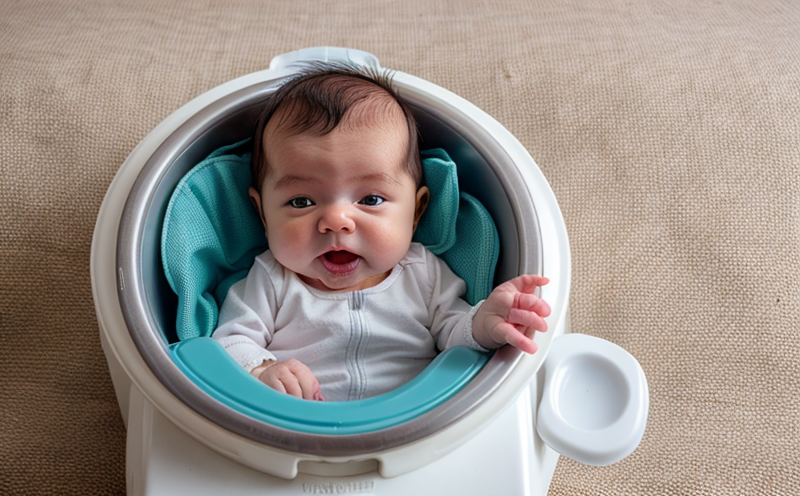ISO 46322 Microbiological Testing in Infant Formula
The ISO 46322 standard provides a comprehensive framework for microbiological testing of infant formula. This internationally recognized guideline is designed to ensure that the products meet stringent hygiene and safety standards, thereby protecting infants from potential health risks associated with microbial contamination.
The process involves several critical steps, including the collection and preparation of samples, inoculation into appropriate media, incubation under controlled conditions, and final enumeration or identification of microorganisms. The standard covers a range of pathogens and opportunistic microorganisms that could pose threats to infants, such as Listeria monocytogenes, Salmonella spp., and E. coli O157:H7. It also mandates the detection of spoilage indicators like yeasts and molds.
The testing process is highly sensitive and specific, requiring advanced microbiological techniques such as quantitative PCR (qPCR) for pathogen detection and chromogenic agar methods for enumeration. Compliance with ISO 46322 ensures that infant formula meets not only legal but also ethical standards by reducing the risk of foodborne illnesses.
For effective testing under this standard, it is crucial to adhere strictly to the prescribed sampling protocols which take into account the homogeneity and representativeness of the samples. The choice of media used for cultivation plays a pivotal role in identifying pathogenic agents accurately. Additionally, the use of validated reference methods ensures reliable results.
The importance of accurate testing cannot be overstated, as even minor deviations from standard procedures can lead to false positives or negatives, potentially impacting product safety and consumer confidence. Therefore, laboratories must invest in state-of-the-art facilities equipped with advanced technologies like flow cytometry for rapid identification and quantification of microorganisms.
Compliance with ISO 46322 is mandatory for manufacturers aiming to enter the infant formula market globally. This standard helps build trust among consumers by ensuring that they receive safe and high-quality products from reputable brands. Moreover, it supports regulatory compliance efforts aimed at safeguarding public health.
Why It Matters
The significance of microbiological testing in infant formula cannot be overstated due to the vulnerability of infants who may have compromised immune systems or are still developing their digestive tracts. Pathogenic microorganisms can cause severe illnesses, including sepsis and meningitis, which could lead to long-term health issues or even death.
By adhering to ISO 46322 standards, manufacturers demonstrate their commitment to producing safe products that meet the highest quality benchmarks. This not only protects consumers but also enhances brand reputation and fosters customer loyalty. Regulatory authorities worldwide rely on these tests as part of their inspections and certifications processes, ensuring adherence to international safety norms.
The results from microbiological testing play a crucial role in guiding corrective actions if any non-compliance issues are detected. This could involve adjusting manufacturing practices, reformulating products, or implementing enhanced quality control measures within production facilities. Such interventions help prevent future occurrences of contamination and maintain the integrity of the supply chain.
In summary, rigorous microbiological testing under ISO 46322 ensures that infant formula remains a safe dietary option for babies worldwide, contributing significantly to their overall health and wellbeing.
Eurolab Advantages
At Eurolab, we pride ourselves on providing unparalleled expertise in microbiological testing for infant formula. Our team of highly trained professionals specializes in this field, ensuring that each test conducted adheres meticulously to the requirements outlined by ISO 46322.
We employ cutting-edge technology and equipment, including advanced flow cytometers and qPCR machines, which enable us to deliver precise and reliable results swiftly. This capability allows us to support clients promptly during critical stages of product development or when addressing regulatory concerns.
Our state-of-the-art laboratories are equipped with all necessary facilities for comprehensive testing, including specialized media preparation areas and controlled-environment chambers for incubation. We also maintain strict quality assurance protocols throughout the entire testing process to guarantee accuracy and consistency in our findings.
In addition to technical excellence, Eurolab offers personalized service tailored to individual client needs. Our experts work closely with manufacturers to understand their specific requirements and challenges, offering strategic advice on how best to meet regulatory expectations while maintaining product quality standards.
By choosing Eurolab for your microbiological testing needs related to infant formula, you can rest assured that you are partnering with a trusted leader in the industry. Our commitment to excellence sets us apart as the go-to choice for ensuring safety and compliance across all aspects of this critical sector.
Customer Impact and Satisfaction
The impact of microbiological testing under ISO 46322 extends beyond just meeting regulatory requirements; it significantly enhances customer satisfaction and trust. When consumers know that the products they purchase have been rigorously tested according to international standards, they feel more secure about their choices.
Manufacturers who comply with these stringent guidelines enjoy enhanced credibility among both existing customers and potential new ones. They are able to present themselves as leaders in infant nutrition safety, which can translate into increased market share and brand loyalty.
The results of microbiological testing serve as important tools for continuous improvement within manufacturing processes. By identifying any shortcomings early on through thorough analysis, companies can implement necessary changes more effectively than waiting until issues arise post-production.
Moreover, compliance with such rigorous standards helps protect against legal challenges or recalls that could otherwise result in costly disruptions to business operations. In essence, adherence to ISO 46322 not only safeguards public health but also provides tangible benefits for businesses operating in this sensitive market segment.





